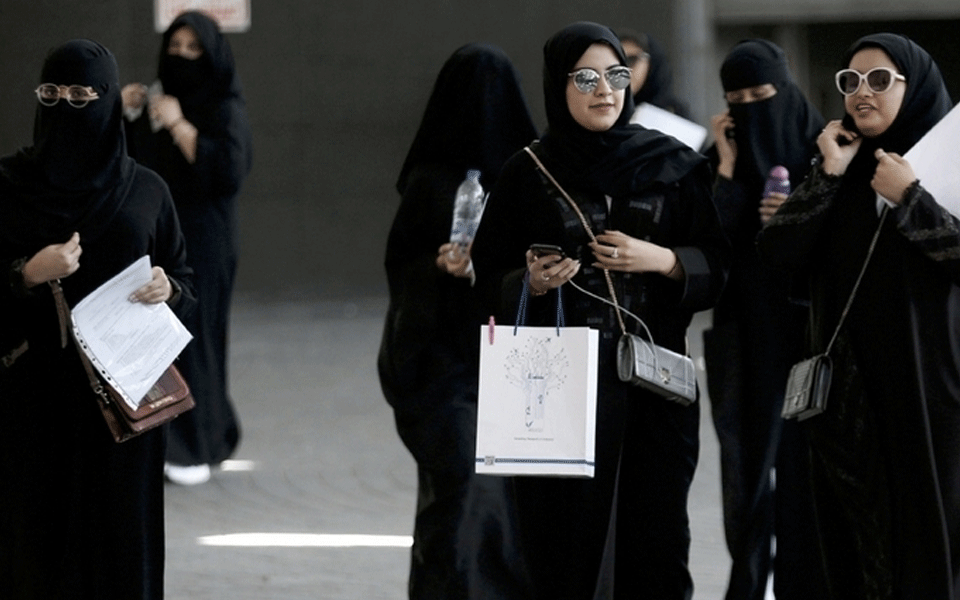Riyadh: Saudi Arabia will allow women to travel abroad without approval from a male "guardian", the government said Thursday.
The landmark reform erodes the longstanding guardianship system that renders women permanently as legal minors and allows their "guardians" -- husband, father and other male relatives -- to exercise arbitrary authority over them.
The decision, following years of campaigning by activists, comes after high-profile attempts by women to escape their guardians despite a string of change including a historic decree last year that overturned the world's only ban on female motorists.
"A passport will be granted to any Saudi national who submits an application," said a government ruling published in the official gazette Umm Al Qura.
The regulation effectively allows women over the age of 21 to obtain passports and leave the country without their guardian's permission, the pro-government Okaz newspaper and other local media reported, citing senior authorities.
Women in the kingdom have long required permission from their male "guardians" to marry, renew their passports or exit the country. The pro-government Saudi Gazette newspaper hailed the decision as "one giant leap for Saudi women".
The ruling comes as Saudi Arabia faces heightened scrutiny over its human rights record, including an ongoing trial of women activists who have long demanded that the guardianship system be dismantled.
That includes Loujain al-Hathloul, a prominent rights activist who marked her 30th birthday this week in a Saudi prison, campaigners said.
Alongside a sweeping crackdown on dissent, Crown Prince Mohammed bin Salman -- the kingdom's de facto ruler -- spearheads a wide-ranging liberalisation drive that is aimed at transforming the conservative petro-state, long criticised for its treatment of women.
His changes include the much-celebrated decision allowing women to drive in June last year, allowing women to attend soccer games alongside men and take on jobs.
But while transforming the lives of many women, critics said the reforms will be cosmetic for many others until the kingdom abolishes the "guardianship" system that gives men arbitrary authority over their female relatives.
Some have undertaken perilous attempts to escape overseas despite the reforms.
They include 18-year-old Rahaf al-Qunun, whose live-tweeted asylum plea from a Bangkok hotel in January after she fled her Saudi family drew global attention.
Saudi officials have expressed commitment to fighting guardianship abuse, but have warned the system can only be dismantled piecemeal to prevent a backlash from arch-conservatives.
In a one-off case last year, a Saudi court ruled in favour of a 24-year-old woman who challenged her father's decision to not let her have a passport.
But until Thursday's ruling, she would have still required his permission to travel.
Let the Truth be known. If you read VB and like VB, please be a VB Supporter and Help us deliver the Truth to one and all.
New Delhi (PTI): West Bengal Chief Minister Mamata Banerjee has filed a petition in the Supreme Court against the ongoing Special Intensive Revision (SIR) of the electoral rolls in the state, sources said on Sunday.
The petition names the Election Commission (EC) and the chief electoral officer of West Bengal as respondents. It was filed before the apex court on January 28, the sources said.
Banerjee arrived in Delhi on Sunday. She is scheduled to meet Chief Election Commissioner (CEC) Gyanesh Kumar at 4 pm on Monday to discuss the ongoing SIR exercise in West Bengal. The Trinamool Congress (TMC) supremo would be accompanied by a delegation of party leaders.
She is also likely to meet party MPs in the Parliament House on Monday.
Talking to reporters at the Kolkata airport before leaving for the national capital, Banerjee claimed that the ruling Bharatiya Janata Party (BJP) at the Centre is resorting to the SIR exercise because it is certain of its imminent defeat in the West Bengal Assembly polls, due in a few months, and said the saffron party should contest the election politically and democratically.
The West Bengal chief minister has written several letters to the CEC, raising concerns over the conduct of the exercise.
In her most recent letter to the CEC on January 31, she alleged that the methodology and approach of the exercise went beyond the provisions of the Representation of the People Act and the relevant rules, causing "immense inconvenience and agony" to citizens.
Earlier, TMC leaders, including Rajya Sabha MPs Derek O'Brien and Dola Sen, had moved the apex court, challenging certain aspects of how the SIR is being carried out in West Bengal.





